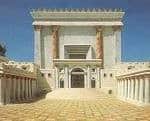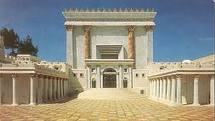 Moshe Rabbeinu ( Moses) is the man who walked between Heaven and Earth. He is the man who spoke to G-d as men speak to each other, panim el panim, that is to say, “face to face.” This is the man who walked into the fiery mountain and felt the Glory of G- d pass over him. This man at the end of his life had but one request, one final plea:
Moshe Rabbeinu ( Moses) is the man who walked between Heaven and Earth. He is the man who spoke to G-d as men speak to each other, panim el panim, that is to say, “face to face.” This is the man who walked into the fiery mountain and felt the Glory of G- d pass over him. This man at the end of his life had but one request, one final plea:
Pray let me cross over and see the good land that is on the other side of the Jordan , this good mountain and the Levanon” (Deuteronomy 3:25).
What more could he want that would lead him “You, O G-d, have begun to show Your servant Your greatness (3:24).” Rashi points out that Moshe was G-d’s faithful servant, the greatest of the prophets, the recipient of the Torah from G-d. Yet after 120 years of the most G-dly life ever lived, he sees himself as only having begun in his relationship with G-d. What more was he yearning to experience? What was he looking for in the orchards and hills of the land that beckoned and pushed him into willing to give up on his imminent entry into the blissful life of heaven?
Part of the answer lies in the following words:
“Pray let me cross over and see … this good mountain and the Levanon” (Deuteronomy 3:25).
Which goodly mountain and which Levanon is he talking about? Rashi says “The goodly mountain” — this is Jerusalem and “the Levanon” — this is the Holy Temple” .
The word “Levanon” is mentioned 71 in the Tanach.Throughout Jewish tradition and in the Targums, and the Qumran texts, Levanon is always symbolically associated with the Temple .One of the reasons for that is that both Temples were built with the cedars of Lebanon (1 Kings 5:15-24; Ezra 3:7). Probably more important than that is the fact that Our sages point out that our the process of repentance was associated with the whitening that occurred through the Divine service , prayer and teshuvah that transpired at the Holy Temple.
As we read in Isaiah:
“Come now, let us reason together,” says HaShem. “Though your sins are like scarlet, they shall be as white as snow (Kesheleg yalbinu ); though they are red as crimson, they shall be like wool” (Isaiah 1:18)
Moshe yearned to see the “goodly mountain” – Mount Moriah – and Levanon ,the temple which stands upon it because that place represents the heart of all humanity. Moshe wanted to be part of the fulfillment of the divine commandment first received by Moshe and the children of Israel in the desert: “Build for me a sanctuary, that I may dwell amongst you” (Exodus 25:8).
This Temple is not only significant for the Jewish people . It is in fact critical to the whole world
The world as we see around us is slipping into chaos. All the things that were thought of as safe anchors are slowly slipping away. All the powers that we thought would last forever are simply ebbing away.All this is also happening in a quickened pace.
Where then must the world turn? Obviously it is clear to all of us who walk in the shadow of our Creator that all must turn to their Father in heaven. Yet the bible also gives a physical direction as well. This is a direction that has been painfully missing for so very long and is one that is felt especially in these days. The prophets, we know, never repeat the same words from prophet to prophet, except in one glaring case. We read in Isaiah 2:
And it shall be at the end of the days, that the mountain of the Lord’s house shall be firmly established at the top of the mountains, and it shall be raised above the hills, and all the nations shall stream to it. And many peoples shall go, and they shall say, “Come, let us go up to the Lord’s mount, to the house of the God of Jacob, and let Him teach us of His ways, and we will go in His paths,” for out of Zion shall the Torah come forth, and the word of the Lord from Jerusalem And he shall judge between the nations and reprove many peoples, and they shall beat their swords into plowshares and their spears into pruning hooks; nation shall not lift the sword against nation, neither shall they learn war anymore (Isaiah 2:1-4).
The prophet Michah repeats the prophecy word for word and adds one more verse:
And they shall dwell each man under his vine and under his fig tree, and no one shall make them move, for the mouth of the Lord of Hosts has spoken.( Micha 4:4)
Why would G-d ensure that his messengers repeat this prophecy word for word? It is almost as if G-d wanted to make sure that the world does not attempt to spiritualize His words. He wanted to ensure that the world knows that He was speaking clearly and literally. There will be those that will say that the future temple will only be in ensconced and perceived in our hearts. There are others that minimize those final days to a period of World peace and tranquility. Both of these thoughts may be correct but completely underestimate G-d’s ultimate plan.
The United nations building in New York City has emblazoned on one of its walls the following words;” and they shall beat their swords into plowshares and their spears into pruning hooks; nation shall not lift the sword against nation, neither shall they learn war anymore” That is a wonderful thought and idea. The only difficulty with their declaration is that they left out the beginning of the verse .” the Lord’s house shall be firmly established at the top of the mountains, and it shall be raised above the hills, and all the nations shall stream to it.”
We have just experienced the days wherein the Jewish people have been mourning the destruction of the Temple and are still in the midst of deep yearning for its rebuilding. It seems that the rest of the world must begin to look deeply into themselves and into the Biblical words they hold so dear and sanctified and find that same sense of mourning and yearning. Otherwise they will slip deeper and deeper into chaos. This Temple which will again rise over the city of Jerusalem is not only the house of worship for the people of Israel.” for My house shall be called a house of prayer for all peoples (Isaiah 56:7).
